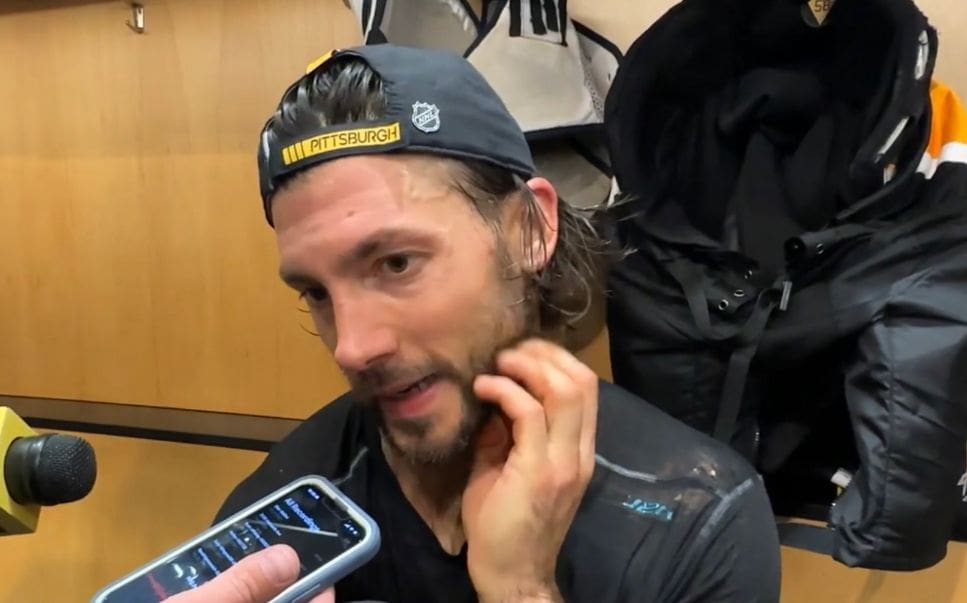Penguins
One Question: What Do Players Think of the Push for Penguins to Tank?

If a team is going to tank, the person most instrumental in that process is the general manager, and there does not seem to be an indication that Pittsburgh Penguins president of hockey operations/GM Kyle Dubas has tanking in mind.
Although he made trades and acquired a bundle of assets leading up to and at the NHL trade deadline earlier this month, Dubas retained a core of players who could still be part of a retool, rather than leave the cupboard bare so the Penguins could finish low enough in the standings to have high odds of getting a prime pick in the draft lottery.
That didn’t stop, and hasn’t stopped, a faction of fans – and some media types – from openly calling for the Penguins to tank, if you monitor social media and website comments. The idea being, since it’s not realistic for them to make the playoffs – for the third year in a row – they should aim to finish as low as possible in standings to increase their chances for a great slot, even perhaps first overall, in the draft lottery.
In this incarnation of One Question, PHN wanted to survey a handful of players about the general idea of the team tanking. After all, while the GM can manipulate the roster, it’s the players who still have to finish the season.
So we put forth the question, prefaced with the fact that the GM has most of the control: What’s your reaction to the fans and observers who think the Penguins should tank?
One guy struggled with the question. One said it was easy. A couple others gave expanded answers.
The player who was uncomfortable with the question was the youngest one asked.
“I don’t really know what to say. That’s not my job,” winger Philip Tomasino said. “We can let the fans discuss that one. I think we’re in good hands with Kyle. I don’t think (tanking) is the mindset around here.”
Veteran forward Kevin Hayes was succinct.
“I don’t believe in that,” he said. “We get paid to do a job, and that’s what we’re going to do.”
PHN didn’t think this One Question would be complete without asking a couple of the Penguins’ longtime core players.
First in that category was team captain and one of the best to play the game, center Sidney Crosby. While he took a couple seconds to absorb the question, he was the one who thought it was easy to answer.
“I’ll leave that to other people, but we try to win every single game,” Crosby said.
Seriously, even if he were part of a team whose aim was to tank, could anyone see Crosby cooperating, or dealing well with being part of that strategy?
Before we get to the second core player asked, let’s consider top-line winger Rickard Rakell’s response. Tanking usually goes hand-in-hand with a tear-it-down rebuild. The fact that Rakell did not get traded is one strong indication that the Penguins are not in tank mode, regardless of any push from the outside.
Rakell offered a wider take on the general issue of tanking.
“Just look at Washington, where they are right now — they didn’t do a full rebuild; they just retooled, added a few pieces. And now they’re right back at the top again,” Rakell said. “I don’t necessarily think you have to go through the whole five-, 10-year plan to be a contender again. I think it’s just about finding the right pieces for the team. Washington is a good example right now.”
The other core player PHN surveyed was defenseman Kris Letang, who provided a thoughtful answer despite opening with, “I don’t pay attention to what people think.”
Letang made it clear he does not believe tanking is effective.
“I would like to get an example of a team that tanked and won the Stanley Cup,” he said. “If they can prove that to me, maybe I would believe in it.”
There was a time when the Penguins almost assuredly tanked – although then-GM Eddie Johnston has never officially copped to it. In 1983-84, the Penguins finished 16-58-6, “edging” New Jersey for last in the league standings. That earned them the right to draft a guy named Mario Lemieux.
Of course, back then there was no draft lottery that simply improved the chances of drafting at or close to the top of the first round. Whoever finished last was guaranteed the first overall pick to do with as they wished.
And even though the Penguins’ last-place finish that season led to them drafting an all-time great, it still took the team five years to make the playoffs and seven to win the Cup with Lemieux.
So, especially in today’s NHL, Letang’s challenge would seem to hold up.
Letang also believes that tanking is the antithesis of a team growing into a contender the proper way.
“I just think young players should grow through veteran players like me, Sid and (Evgeni Malkin) did,” he said. “I just think that’s the way you’re going to learn the most. Sometimes if you look at any job, if you want to get to the top, you have to go through every position. I think as a player you have to be put in a lot of positions to become a better player, a better veteran, a better person.
“So I don’t think tanking … I don’t agree with it.”


